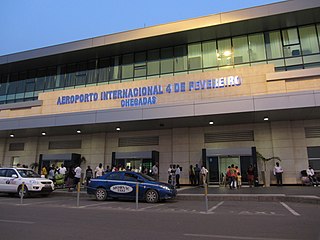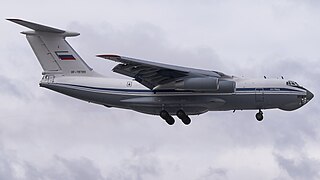
The Ilyushin Il-62 is a Soviet long-range narrow-body jetliner conceived in 1960 by Ilyushin. As a successor to the popular turboprop Il-18 and with capacity for almost 200 passengers and crew, the Il-62 was the world's largest jet airliner when first flown in 1963. The seventh quad-engined, long-range jet airliner to fly, it was the first such type to be operated by the Soviet Union and a number of allied nations.

The Ilyushin Il-76 is a multi-purpose, fixed-wing, four-engine turbofan strategic airlifter designed by the Soviet Union's Ilyushin design bureau as a commercial freighter in 1967, to replace the Antonov An-12. It was developed to deliver heavy machinery to remote and poorly served areas. Military versions of the Il-76 have been widely used in Europe, Asia and Africa, including use as an aerial refueling tanker and command center.

Kabul International Airport is located in the northern part of Kabul, Afghanistan. It is one of the country's main international airports, capable of housing over a hundred military and civilian aircraft. It is currently operated by UAE-based GAAC Holding and Afghanistan's Ministry of Transport and Civil Aviation.

Quatro de Fevereiro International Airport, is the main international airport of Angola. It is located in the southern part of the capital Luanda, situated in the Luanda Province. Quatro de Fevereiro means 4 February, which is an important national holiday in Angola, marking the start of the armed struggle against the Portuguese colonial regime on 4 February 1961. In 2018, about 5.6 million passengers were handled.

Vnukovo, formally Vnukovo Andrei Tupolev International Airport, is a dual-runway international airport located in Vnukovo District, 28 km (17 mi) southwest of the centre of Moscow, Russia. It is one of the four major airports that serve Moscow, along with Domodedovo, Sheremetyevo, and Zhukovsky.
Kazakhstan Airlines was an airline from Kazakhstan, serving as national flag carrier of the country from its independence in 1991 until 1996. Following the disaster of the Charkhi Dadri mid-air collision, Kazakhstan Airlines ceased operations, and its role as flag carrier was transferred to Air Kazakhstan.

Ahmed Sékou Touré International Airport, also known as Gbessia International Airport, is an airport serving Conakry, capital of the Republic of Guinea in West Africa. It parallels the south shore of the Kaloum Peninsula approximately five kilometers from its tip. Autoroute Fidel Castro connects the airport to Conakry proper.

Gao International Airport, also known as Korogoussou Airport, is an airport in Gao, Mali. The airport's runway crosses through the prime meridian.

As of December 2024, a total of 64 Boeing 747 aircraft, or just above 4% of the total number of 747s built, first flown commercially in 1970, have been involved in accidents and incidents resulting in a hull loss, meaning that the aircraft was either destroyed or damaged beyond economical repair. Of the 64 Boeing 747 aircraft losses, 32 resulted in no loss of life; in one, a hostage was murdered; and in one, a terrorist died.
This is a list of aviation-related events from 2009.

The 2009 Iranian Air Force Il-76MD Adnan 2 accident occurred on 22 September 2009, when an Ilyushin Il-76MD Adnan 2 crashed during a flyby near the city of Tehran. Sources conflict on the cause of the loss, with some stating that there was a mid-air collision with an Iranian Air Force Northrop F-5E Tiger II or a HESA Saeqeh, and others stating that the rotodome detached from the aircraft, striking and removing the tailplane while the aircraft was manoeuvring for an emergency landing following an engine fire. The crash resulted in the deaths of all seven people on board the plane and the destruction of Iran's only functional airborne early warning and control (AWACS) aircraft.
Talas Airport is an airport serving Talas, the capital of Talas Province (oblast) of Kyrgyzstan. The Russian code for Talas Airport is ТЛС.

Aeroflot Flight 721 was a scheduled domestic passenger flight between Moscow and Yuzhno-Sakhalinsk in the Russian SFSR. On Wednesday, 2 September 1964, the aircraft flying this route, an Ilyushin Il-18V, crashed into the side of a hill on approach to Yuzhno-Sakhalinsk, killing 87 of the 93 people on board. At the time of the accident, it was the deadliest Il-18 crash and the deadliest aviation accident on Russian soil.

In the early morning of June 24, 2022, an Ilyushin Il-76MD cargo aircraft of the Russian Air Force was operating a flight from Orenburg Tsentralny Airport to Belgorod International Airport with an intermediate flight to Dyagilevo air base crashed immediately after takeoff from Dyagilevo air base, near the Mikhailovsky highway area in the city of Ryazan.

Rus Flight 9633 was a cargo flight operated on an IL-76TD aircraft of Rus Airlines from Chkalovsky Airport (Moscow) to Taiyuan Wusu Airport (Taiyuan) with intermediate landings at Alykel Airport (Norilsk) and Bratsk Airport (Bratsk). On July 14, 2001, the plane carrying out this flight crashed a few seconds after takeoff from Chkalovsky Airport. All 10 people on board were killed.

On 27 November 1996, a Russian Air Force Ilyushin Il-76 crashed near Abakan Airport, Russia, killing all 23 people onboard. The plane was on a cargo flight from Moscow Ramenskoye Airport to Petropavlovsk-Kamchatsky Airport, with a scheduled stopover at Abakan International Airport.















